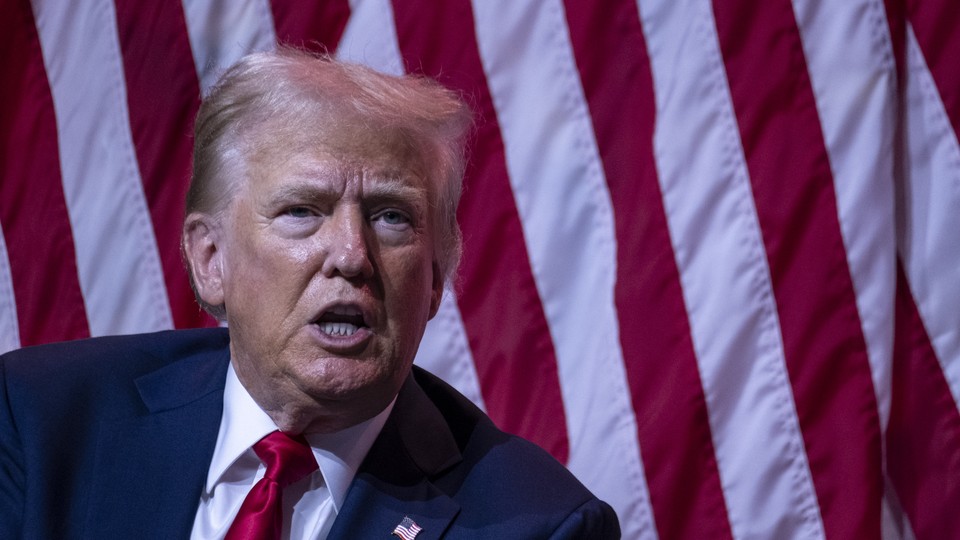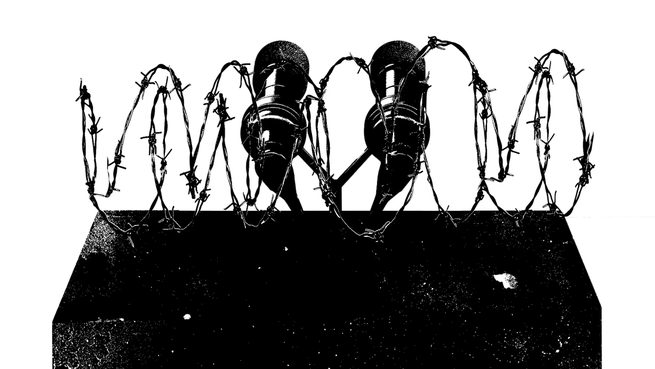The Problem With Donald Trump’s VP Theory
6 min read
This is an edition of The Atlantic Daily, a newsletter that guides you through the biggest stories of the day, helps you discover new ideas, and recommends the best in culture. Sign up for it here.
Vice-presidential candidates are highly scrutinized, but Donald Trump recently said that they have no impact on a race. Is he right?
First, here are three new stories from The Atlantic:
- David A. Graham: Trump is suddenly running scared.
- What Trump’s Kamala Harris smear reveals
- The brilliance in James Baldwin’s letters
The VP Effect
“Historically, the vice president, in terms of the election, does not have any impact,” Donald Trump declared onstage Wednesday at the National Association of Black Journalists convention. This was a bizarre thing for a candidate to say when asked whether his running mate would be ready to serve as president if needed. Although it’s true that vice-presidential nominees alone don’t tend to determine the outcome of elections, the reality is more complicated than Trump suggests.
“Even if the impact of the vice-presidential candidates is marginal, many of our elections are decided at the margins,” Joel Goldstein, a professor emeritus at Saint Louis University and the author of The White House Vice Presidency, told me. People usually don’t vote for someone just because they like their running mate, but selecting a running mate is among the first significant presidential acts a candidate makes—and it tells voters a great deal about the candidate’s leadership style and strategy. A solid decision can strengthen how voters view the person leading the ticket (when Barack Obama chose Joe Biden, in 2008, voters may have seen that as a sign that Obama would surround himself with experienced politicians, Goldstein said), and an unpopular one can make them look weaker (the Sarah Palin choice quickly became a liability for John McCain). “What the pick actually tells you is more about the candidate themselves: their judgment, their relationship with someone else,” my colleague Elaine Godfrey, who has covered the veepstakes, explained.
People tend to over-index on how much a vice-presidential pick who appeals to certain groups can tilt a race, Christopher Devine, an associate professor at the University of Dayton and a co-author of Do Running Mates Matter?, told me. By and large, Devine and his co-author, Kyle Kopko, have not found clear evidence that a running mate’s “home-state advantage” or demographic appeal play a decisive role in whom people vote for. One exception was the 2020 election, when, Devine and Kopko observed, Vice President Kamala Harris likely delivered Democrats a small number of additional votes among Black, women, and Black women voters. But they saw no proof that Mike Pence actually pulled in evangelicals in 2016—though Devine noted that some Republicans reluctant to support Trump pointed to Pence, a more established and traditional politician, as a way to save face when they voted for him anyway.
For the Democratic ticket, Harris is expected to announce her running mate by Tuesday. She is reportedly eyeing swing-state politicians such as Senator Mark Kelly of Arizona and Pennsylvania Governor Josh Shapiro. Choosing a centrist from a purple state could help soften perceptions of Harris as a progressive, but it would not guarantee that a swing state such as Pennsylvania is in the bag for Democrats, Devine argued.
Meanwhile, the Republican ticket has been deluged with negative press over its VP pick. Senator J. D. Vance of Ohio broke records as the least-liked nonincumbent vice-presidential candidate coming out of their party’s convention since 1980, according to CNN’s Harry Enten. Vance’s past comments denigrating “childless cat ladies” and criticizing Trump as “cultural heroin” in a 2016 essay for this magazine have followed him on the trail. If some voters end up thinking that Vance—who has minimal experience on the national stage and has served less than two years in elected office—is not up for the job, Trump’s credibility could sink in their eyes. Why pick him, they might wonder, when more qualified Republicans were available? That question may be on voters’ minds given the other crucial role of the vice president: taking over as successor if the president dies or is unable to serve while in office—a situation that has become especially relevant in recent elections (Trump would be the oldest president elected in history).
For all of Vance’s weaknesses, Trump is still not likely to drop him from the ticket, Goldstein said. “For Trump to replace him would be an acknowledgement of making a bad decision,” he explained—something Trump may be loath to admit (even if he did make the choice before Biden dropped out). If Vance’s performance doesn’t improve, Goldstein predicted that Trump’s campaign will more likely try to keep Vance out of view by sending him to lower-profile media appearances and limiting his public events. “It’s harder nowadays to bury or hide a running mate,” Goldstein said. But the Trump team could try.
A vice-presidential nominee’s main function is to support a presidential candidate—and to avoid bringing them down. VPs don’t always get credit when they boost the energy and appeal of the ticket, but if they are a drag or a liability, all eyes are on them. It’s like what my high-school drama club used to say about the stage crew: People don’t tend to notice when they do a good job, but if they mess up, everyone pays attention.
Related:
- J. D. Vance, Trump’s regrettable impulse buy
- Kamala Harris’s white-boy summer
Today’s News
- Vice President Harris secured enough delegate votes to win the Democratic presidential nomination. She is poised to become the first Black woman and the first Asian American to lead a major party ticket.
- U.S. Secretary of State Antony Blinken said last night that there was “overwhelming evidence” that the opposition leader Edmundo González Urrutia beat President Nicolás Maduro in Venezuela’s presidential election.
- The Department of Justice sued TikTok and its parent company, ByteDance, over allegations that TikTok broke a child-privacy law by collecting data on American users younger than 13 without their parents’ permission.
Dispatches
- The Weekly Planet: Trees are nice and all, but they’re not enough, Emma Marris writes. Shade will make or break American cities.
- The Books Briefing: James Baldwin’s personal letters deserve as much recognition as his novels and plays, Emma Sarappo writes.
- Atlantic Intelligence: Tech firms have been spending historic amounts of money on AI, Matteo Wong writes. But will their investments pay off?
Explore all of our newsletters here.
Evening Read

There’s No Such Thing as a Border Czar
By Caitlin Dickerson
When Laura Flores Godoy arrived at a chaotic border crossing in Zulia, Venezuela, in December, border guards stopped her and demanded a $40 bribe—more than 10 times the monthly income of many Venezuelans, thanks to President Nicolás Maduro’s disastrous handling of the country’s economy. Flores Godoy fought with the guards, she later told me, saying she was going to need every dollar she had to get her 8-year-old daughter to the United States, thousands of miles away, in buses and taxis and on foot. But all around them, she saw other families emptying backpacks and turning out their pockets, apparently willing to give up anything they were carrying in order to flee …
According to Republicans in Congress, Vice President Kamala Harris is to blame for this. They have labeled her the Biden administration’s “border czar.”
Read the full article.
More From The Atlantic
- Kamala Harris’s lucky break
- The real trade-off with Russia
- Radio Atlantic: One Israeli hostage’s unusual experience in Gaza
Culture Break

Check out. This photo of the kayaker Amir Rezanejad Hassanjani, originally from Iran and now part of the Refugee Olympic Team, who is making a big splash.
Read. “The Contract,” a poem by Tara Ballard:
“It was evening in Glyfada, / and blackout curtains were drawn / across each window, making invisible / the pistachio trees that sweetened / the courtyard.”
Play our daily crossword.
Stephanie Bai contributed to this newsletter.
When you buy a book using a link in this newsletter, we receive a commission. Thank you for supporting The Atlantic.



